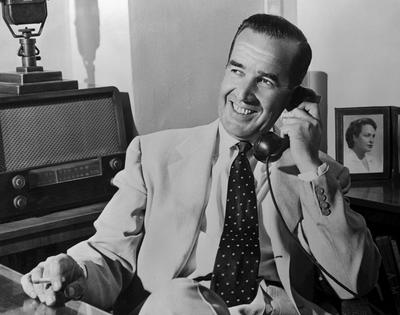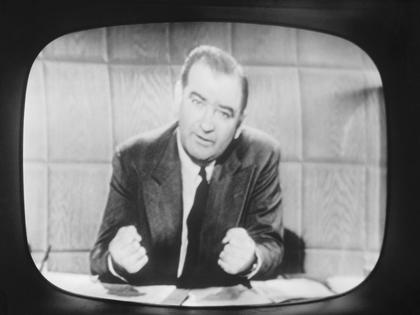Though CBS legend Edward R. Murrow is given credit, he wasn’t the first muckraking journalist to question Joseph McCarthy’s communist witch hunts
Published in Political News
It has been 70 years since Edward R. Murrow’s withering broadcast report about Cold War demagogue Sen. Joseph R. McCarthy, a program that has been called television’s “finest half-hour.”
Legendary though it may be, it took more than a television show to take down McCarthy and short-circuit his relentless drive to rid the federal government of communist sympathizers.
The 70th anniversary of the program that aired March 9, 1954, is likely to be recalled by some historians in nostalgic terms – how Murrow, supposedly alone in American journalism, had the courage and national stature to confront McCarthy and expose him for the Red-baiting menace that he was.
McCarthy, an otherwise obscure Republican U.S. senator from Wisconsin, had unsettled 1950s America with thinly documented charges of communists infiltrating and subverting the State Department and other federal agencies. As chairman of the Senate Permanent Subcommittee on Investigations from 1953-54, McCarthy grilled and bullied witnesses in a relentless effort to root out Americans who supposedly sympathized with Soviet communism.
As the popular version of the story goes, McCarthy’s power was unchecked until Murrow aired his searching report on the CBS newsmagazine show “See It Now.”
As my research has demonstrated, however, that interpretation about the impact of Murrow’s report is a tenacious media myth — a well-known tale about the news media that is widely believed and often retold but which, under scrutiny, dissolves as apocryphal.
The Murrow-McCarthy myth overlooks the belated nature of Murrow’s report and minimizes the aggressive work of journalists who took on the senator long before the “See It Now” program in 1954.
Two of those journalists paid a steep price for doing so.
As I wrote in my media-mythbusting book, “Getting it Wrong”: “It wasn’t as if Americans in early 1954 were hoping for someone to step up and expose McCarthy, or waiting for a white knight like Murrow to tell them what a toxic threat the senator posed.”
They already knew.
Murrow’s program aired more than four years after McCarthy had launched his campaign against communists in government — and more than four years after muckraking journalist Drew Pearson had challenged the senator’s claims as flimsy and outlandish.
Pearson, who wrote the nationally syndicated “Washington Merry-Go-Round” newspaper column, lacked the popularity and pedigree of Murrow, who made his reputation in vivid radio reports from Britain during World War II.
Pearson was an unlikable figure, eager to meddle in policymaking and often overbearing.
But Pearson quickly recognized the dubious character of McCarthy’s allegations.
In a column in February 1950, Pearson disputed McCarthy’s assertions that scores of communists apparently had infiltrated the State Department, writing that when the senator “finally was pinned down, he could produce … only four names of State Department officials whom he claimed were communists.”
Of the four, Pearson wrote, one had never worked for the State Department, two had resigned years earlier and the fourth had been cleared of any allegation of being a communist.
Pearson also scrutinized the senator’s income tax filings and his acceptance of suspicious campaign contributions.
Pearson’s columns angered the hulking McCarthy, who in December 1950 confronted the columnist at the end of a private dinner party in Washington.
McCarthy assaulted Pearson either by punching him or slapping him or kneeing him in the groin. Versions varied.
The man who broke up the encounter was future U.S. president Richard Nixon, who had been sworn in as senator a few days before the dinner party. In his memoir, “RN,” Nixon wrote that Pearson “grabbed his overcoat and ran” while McCarthy muttered, “‘You shouldn’t have stopped me, Dick.’”
Soon afterward, McCarthy took to the Senate floor to denounce Pearson as a “diabolically” clever “voice of international communism,” a “fake” and a “Moscow-directed character assassin.”
McCarthy also took aim at the sponsor of Pearson’s lucrative Sunday night radio program, Adam Hat Stores Inc. The senator declared that “anyone who buys from a store that stocks an Adams hat is unknowingly contributing at least something to the cause of international communism by keeping this communist spokesman on the air.”
A week later, Adam Hat said it would not renew its sponsorship of Pearson’s radio show, citing “a planned change in advertising media.”
The decision cost Pearson thousands of dollars.
Pearson wasn’t the only prominent journalist to challenge McCarthy years before Murrow’s program. Another was James Wechsler, editor of the then-liberal New York Post, which in 1951 published a bare-knuckled, 17-part series of articles about McCarthy’s allegations and excesses.
The closing installment likened the hard-drinking McCarthy to “a drunk at a party who was funny half an hour ago but now won’t go home.”
In retaliation, McCarthy hauled Wechsler before his Senate subcommittee and grilled him about his former association with a communist youth group.
Wechsler described the closed-door session as little more than “a reprisal against a newspaper and its editor for their opposition” to McCarthy and his methods.
CBS’ “See It Now” program 70 years ago featured extensive and impressive use of video clips to puncture a series of half-truths and exaggerations that McCarthy had told during the early 1950s.
It made for good television, critics agreed. It also projected a certain familiarity.
“Murrow said nothing, and his cameras showed nothing, that this and some other newspapers have not been saying — and saying more strongly — for three or four years,” Jay Nelson Tuck of the New York Post said in his review at the time.
“The news,” he added, “was in the fact that television was saying it at all.”
The most dramatic blow against McCarthy in early March 1954 wasn’t Murrow’s program.
Two days after the show, the U.S. Army publicly accused McCarthy and a top aide, Roy Cohn, of applying pressure to gain preferential treatment for Cohn’s friend and assistant, G. David Schine, who had been drafted into military service.
The charges became a centerpiece in spring 1954 of the televised Army-McCarthy hearings, which were a prelude to the senator’s censure that year and his political eclipse.
McCarthy died in 1957 from complications of alcohol abuse and hepatitis. He was 48 years old.
Murrow left CBS in 1961 to become head of the U.S. Information Agency. He was 57 when he died in 1965 of lung cancer.
This article is republished from The Conversation, a nonprofit, independent news organization bringing you facts and trustworthy analysis to help you make sense of our complex world. It was written by: W. Joseph Campbell, American University School of Communication
Read more:
Has Donald Trump had his Joe McCarthy moment?
A brief history of television interviews – and why live TV helps those who lie and want to hide
George Kennan urged American leadership and patience to counter the Soviets. Instead, the Cold War ensued
W. Joseph Campbell does not work for, consult, own shares in or receive funding from any company or organization that would benefit from this article, and has disclosed no relevant affiliations beyond their academic appointment.
































































Comments